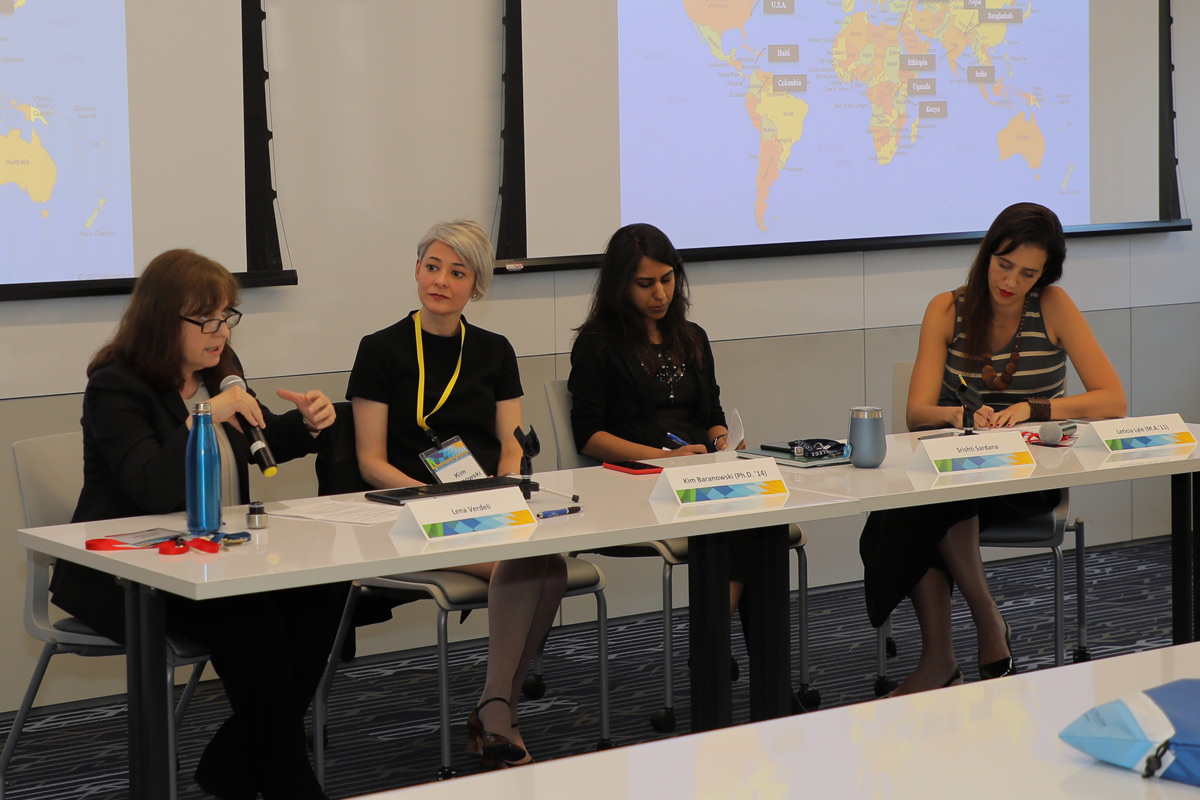Currently 70 million people worldwide have been displaced from their homes – but beyond that fact, their cultures, circumstances, needs and experience of displacement itself vary widely. The first order of business for mental health providers and others is the classic dictum to “do no harm,” which, practically speaking, means that, rather than parachuting in with a one-size-fits-all solution, they must instead learn and understand these differences and be guided by the communities they serve in developing tailored approaches.
Such was the consensus judgement of the four speakers on Academic Festival 2019’s global mental health panel: moderator Leticia Lyle (M.A. ’11), Founding Partner and Global Chief Education Officer at Camino Education in Brazil; Kim Baranowski (Ph.D. ’14), Associate Director of the Mount Sinai Human Rights Program and lecturer in TC’s Department of Counseling and Clinical Psychology; Lena Verdeli, TC Associate Professor of Clinical Psychology; and Founder and Director, Global Mental Health Lab; and Srishti Sardana, a clinical psychology doctoral scholar & lab manager in the Global Mental Health Lab.
Taken together, Lyle, Baranowski, Verdeli and Sardana represent much of the continuum of psychological and education support required by refugees, asylum seekers and other displaced people. They emphasized the relationship of their work to schools, hospitals and other institutions in a variety of contexts, from supporting Syrian refugees in Lebanon, to helping women who have been victims of physical violence or human trafficking in Colombia and Bangladesh, to aiding children who have experienced trauma during and after the 2015 earthquake in Nepal.
“We go with an awareness that a number of systems have broken down education, social protection, health,” said Verdeli, adding that it’s important to “first try to familiarize ourselves with existing resources. She emphasized the importance of “using the crisis as an opportunity to develop, not just vertical systems, but something that serves the whole population” – helping to counter resentment among the host population, who are often not doing much better than the refugees.
For example, in Lebanon, a tiny country that has absorbed millions of Syrian refugees in recent years, Verdeli and her lab are helping to restructure and reorient the national mental healthcare system.
Efforts to help displaced people also connect to countries’ legal systems, especially as many countries have hardened their stances toward accepting newcomers.
Academic Festival 2019
The day included an extensive lineup of presentations, panels and other events featuring TC faculty, students, alumni and staff.
Baranowski – who earlier in the day had received TC’s Early Career Award – talked about the forensic psychological evaluations she and her staff conduct with people seeking asylum in the United States, particularly from Guatemala, Honduras and El Salvador. For many, these assessments can mean the difference between winning safe haven in the US and being deported back to danger. Indeed, U.S. courts accept these evaluations as legitimate evidence – and Physicians for Human Rights estimates that 90 percent of people who work with a forensic evaluator are ultimately granted asylum.
The key, Baranowski said, is “identify[ing] how the mental health aspect of their experience might negatively impact their application for asylum in the United States. For example, their memory might be significantly impaired; their ability to tell a chronological story is expected to be very challenging, problematic or impossible; or they might face an adversarial situation like being separated from their children.”
Language can be a critical factor in helping the displaced. The panel acknowledged the role of language in big crisis situations, and the struggle in their work because the diagnostic language can mean different things in different cultures and languages. As a clinician, noted Baranowski, one tries to be as attuned as possible to the use of “idioms of distress” such as “My soul hurts” when an individual describes emotional trauma or depression. Sardana, who currently is working with Rohingya refugees in Bangladesh, said it’s critical to identify the “conceptual equivalence” of what is expressed through language. That can be challenging: the Rohingya’s language, for example, is a unique dialect and largely an oral tradition, making for “a challenging experience when we try to understand how they experience depression, or trauma or violence or loss.”
When Lyle asked panelists about whether they see hope in their work, Verdeli noted, “Hope is the necessary condition to recover,” but added that traumatized individuals need access to resources and skills to maintain hope. Accessible, sustainable and scalable mental health services, doctors, skills development, jobs and schools are key. Each panelist shared poignant stories of small victories, resilience and hope in the way individuals see the world and the positive implications for the next generation. They observed that “global“ doesn’t necessary mean the other side of the world; there are also underserved and struggling individuals in our own communities. Lyle herself drew parallels to her experiences as an educator working in underserved New York City schools as well as in impoverished, violent schools in Rio de Janeiro and other parts of Brazil.
In closing, Lyle asked panelists what’s on their “wish list” for the future. Sardana answered:
“The one thing that I continue to learn as a TC student is the great privilege of having the mentors and the resources, the classes that I take, the advisement that I receive – the supervision that’s so formative. It will take an army and I do believe, as a student and a researcher in training, that TC is that army.”
